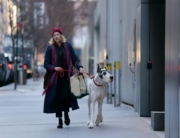![]() The whiplash camera work of a faux-documentary. Actors breaking the fourth wall, staring straight into the camera with a what-the-hell bemused expression. All this plus the underlying cynicism with a smirk will immediately remind viewers of top TV fare such as the American version of The Office. As if on cue, that series’ star, Steve Carell, now blond with bangs, makes his entrance playing another misanthrope with fewer social skills than TV’s Michael Scott, though this time his sad sack has a strong moral conscience. This conviction also propels the film’s rapid-fire, tough-talking dialogue, making this one rude and smartass tragedy in form of a raucous comedy, directed by Adam McKay, one of the founders of the website Funny or Die.
The whiplash camera work of a faux-documentary. Actors breaking the fourth wall, staring straight into the camera with a what-the-hell bemused expression. All this plus the underlying cynicism with a smirk will immediately remind viewers of top TV fare such as the American version of The Office. As if on cue, that series’ star, Steve Carell, now blond with bangs, makes his entrance playing another misanthrope with fewer social skills than TV’s Michael Scott, though this time his sad sack has a strong moral conscience. This conviction also propels the film’s rapid-fire, tough-talking dialogue, making this one rude and smartass tragedy in form of a raucous comedy, directed by Adam McKay, one of the founders of the website Funny or Die.
The filmmakers make hay of the financial meltdown of 2008, using caustic comedy as a weapon. This is more typical—and topical—of what you would see on HBO than what you’d expect from a studio film during the holiday season. Based on Michael Lewis’s best seller, The Big Short could be the 2015 film that most successfully borrows from the currently heralded Golden Age of Television.
Not surprisingly, McKay’s film is filled with sequences that could thrive online on their own: bite-size chapters that bit by bit describe how financial institutions, from hedge funds to the largest banks, gambled with trillions of dollars by playing a shell game of sorts. It started with the mortgage-backed securities bundled together as triple-A valued bonds and bled into subprime mortgage funds. The jargon gets more complicated from there, but one fact is clear: all the financial products mentioned are new ways to make money.
Terms are tossed casually around; none of the high-stakes players portrayed here slow down for anyone. One has to keep up, like a stock trader on coke, but viewers will get the gist even if the intricacies fly over their heads. To its credit, the script lucidly spell out what caused the global financial to teeter on the abyss. (One factoid left unsaid is that many of the holders of subprime home mortgages actually qualified for the standard 30-year fixed rate loan.)
The film zeroes in on the few who foresaw the crash coming, initially a small group of naysayers. All of these Chicken Littles stand to make a killing if they are right: they have bought credit default swaps, a form of insurance that bets against the system, with the expectation that mortgages (that are sold tied together as bonds) are sure to default. It’s just a matter of time. The film is so energetically paced and juggles so many balls, jumping from one storyline to another, that viewers will root for these “outsiders and weirdos” and for the economy to tank, even forgetting that their own 401Ks may have been wiped out in the process. It has a relentless rhythm—until the lights are turned on.
In keeping with the to-the-point sitcom approach, the characters are broadly written and played—they’re types, really. Among this motley bunch: Christian Bale, who has long shed his superhero/hunk status for character roles, plays an addled idiot savant who draws inspiration from heavy metal music, and Finn Wittrock and John Magaro as greenhorn traders hoping to strike it rich. In a supporting role and looking more like the Unabomber than a Wall Street insider, wallflower Brad Pitt acts as a behind-the-scenes adviser to the rubes. He’s catatonic and upstaged by the others. Ryan Gosling narrates as the smug, omnipresent Jared Verrett of Deutsche Bank, wearing an unflattering curly ’fro and wearing tanface. With a cast of preening alpha dogs, the atmosphere is thick with testosterone.
Margot Robbie and Selena Gomez appear in cameos as themselves, explaining financial terms. It might be hard for some to concentrate—Robbie is in a bubble bath, sipping champagne. If part of the humor derives from these beautiful celebrities dissecting the financial nitty-gritty, it isn’t lost on Robbie or Gomez. Do they care? No. Anthony Bourdain is also on hand to expound on collateralized debt obligations, (pooled toxic assets), comparing them to unsold two-day-old halibut.
The dark comedy offers the flip side to the housing market collapse in the tense drama 99 Homes. Both share a vision of an apocalyptic Florida reeling from the real estate bust and portray economic meltdowns set to an electrifying rhythm, though each takes a different tack. If The Big Short is the equivalent of a perp walk of the greedy and stupid, 99 Homes turns the camera toward the victims of the finance schemes. The two films remain fresh after a second viewing and will make you squirm for different reasons.

















Leave A Comment